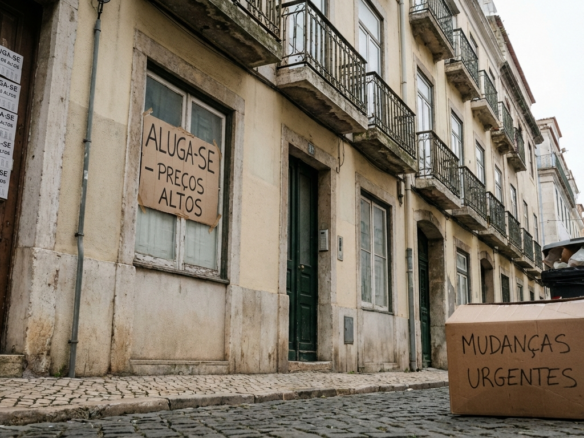Portugal’s construction industry is experiencing a dramatic surge in building costs, creating ripple effects throughout the housing market that are reshaping the nation’s property landscape. Recent data reveals that new home construction expenses have reached unprecedented levels, fundamentally altering the economics of residential development across the country.
Get 50% OFF!
Subscribe to our newsletter and enjoy a 50% discount on all listing packages, no strings attached!

This cost explosion is creating significant challenges for developers, buyers, and the broader Portuguese economy as housing affordability reaches critical levels. The situation has prompted urgent discussions about sustainable solutions to address what many experts are calling a housing crisis that threatens to exclude an entire generation from homeownership.
Portugal’s Construction Costs Hit Record Highs
The Portuguese construction sector has witnessed an extraordinary escalation in building costs, with new residential projects experiencing price increases of up to 30% compared to pre-pandemic levels. Industry reports indicate that the average cost per square meter for new construction has surged from approximately €800 to over €1,040 in major urban centers like Lisbon and Porto. This dramatic increase represents one of the steepest rises in construction costs across the European Union.
Construction companies are reporting that project budgets established just six months ago are now insufficient to complete developments, forcing many to seek additional financing or halt construction entirely. The National Association of Portuguese Construction Companies has documented that nearly 40% of planned residential projects have been delayed or cancelled due to cost overruns. These delays are creating a supply shortage that further exacerbates the housing crisis, as fewer new homes enter the market precisely when demand remains robust.
Material Prices Drive Housing Market Crisis
Raw material costs have emerged as the primary catalyst behind Portugal’s construction cost inflation, with essential building materials experiencing price volatility not seen in decades. Steel prices have increased by 45%, while concrete and cement costs have risen by 35% and 28% respectively. Timber, a crucial component in Portuguese construction, has seen price fluctuations of up to 60% due to global supply chain disruptions and increased demand from international markets.
The ripple effect of these material cost increases extends far beyond individual construction projects, fundamentally altering the housing market’s dynamics. Developers are increasingly reluctant to commit to new projects without significant price premiums, while existing homeowners considering renovations or extensions face budget constraints that often force them to abandon or significantly scale back their plans. This material cost crisis has created a bottleneck effect where housing supply cannot adequately respond to market demand, driving property values higher across both new and existing home segments.
Builders Face Unprecedented Financial Pressure
Construction companies across Portugal are grappling with margin compression as fixed-price contracts signed before the cost surge now threaten their financial viability. Many builders report operating losses on projects that were expected to generate healthy profits, with some companies facing potential bankruptcy if they cannot renegotiate contract terms. The situation has become particularly acute for smaller construction firms that lack the financial reserves to absorb unexpected cost increases.
Labor shortages compound the financial pressures facing Portuguese builders, as skilled construction workers demand higher wages amid increased competition and challenging working conditions. The construction industry is experiencing a 15% shortage in skilled trades, forcing companies to offer premium wages or seek workers from other EU countries. This labor market tightness, combined with soaring material costs, creates a perfect storm that makes new construction projects increasingly unviable under traditional financing and pricing models.
Impact on First-Time Buyers and Families
Young Portuguese families and first-time homebuyers are bearing the brunt of escalating construction costs, as new home prices move further beyond their financial reach. The average price of a newly constructed two-bedroom apartment in Lisbon now exceeds €400,000, requiring household incomes that far exceed the national median. This pricing reality has effectively priced out many middle-class families who previously could aspire to homeownership in urban areas.
The situation has created a generational divide in housing access, where older property owners benefit from asset appreciation while younger demographics face increasingly limited options. Many potential buyers are delaying home purchases indefinitely, opting to remain in rental properties or with family members rather than take on mortgage obligations that consume excessive portions of their income. This demographic shift has broader economic implications, as reduced homeownership rates affect consumer spending patterns and long-term wealth accumulation for Portuguese families.
Government Response to Housing Affordability
Portuguese authorities have acknowledged the severity of the housing affordability crisis and are implementing various measures to address construction cost inflation. The government has announced plans to reduce VAT on construction materials and expedite permitting processes to encourage new development. Additionally, public housing initiatives have received increased funding, though critics argue these measures are insufficient given the scale of the crisis.
Recent policy proposals include creating state-backed loan programs for first-time buyers and establishing rent control mechanisms in high-demand urban areas. However, industry experts caution that these interventions may have unintended consequences, potentially reducing private investment in new construction if profit margins become too constrained. The challenge facing policymakers is balancing affordability improvements with maintaining sufficient incentives for private developers to continue building the housing supply Portugal desperately needs.
Portugal’s soaring construction costs represent more than a temporary market adjustment; they signal a fundamental shift in the country’s housing landscape that requires comprehensive solutions. The convergence of material price inflation, labor shortages, and strong housing demand has created conditions that challenge traditional approaches to residential development and homeownership.
Moving forward, Portugal must navigate the delicate balance between supporting housing affordability and maintaining a viable construction industry. The success of current and future policy interventions will largely determine whether this crisis becomes a temporary disruption or a permanent barrier to housing accessibility for Portuguese families. The coming months will be crucial in establishing whether innovative solutions can emerge to restore balance to this essential sector of the Portuguese economy.





Join The Discussion